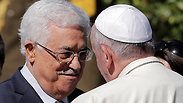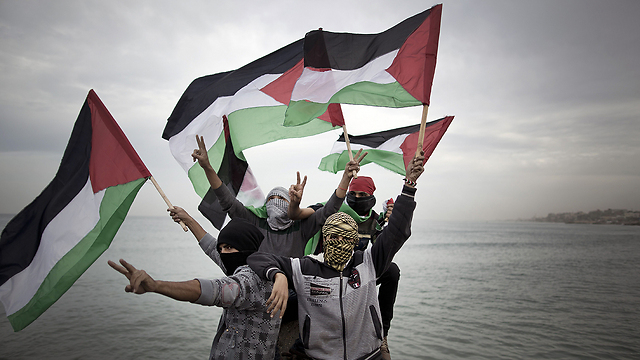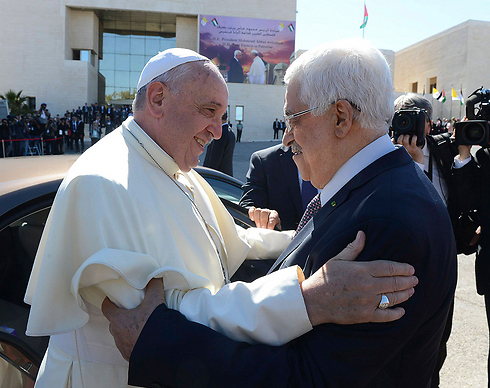
Palestinians want to raise flag at UN headquarters
As non-member observer states, Palestinians seek to raise their flag, as well as that of the Vatican, at UN ahead of pope's visit; Palestinians betting US, Israel won't block plan in fear of risking offending the Holy See.
The Palestinians are seeking to raise their flags at UN headquarters in New York, in a resolution proposing to allow non-member observer states - the Palestinians and the Vatican - to display their flag with the 193 member states - just in time for Pope Francis' visit next month.
Supporters of the idea hope the UN General Assembly will adopt a resolution on the flag-raising shortly before the pope arrives. They're betting that the United States or other allies of Israel will not block the plan and risk offending the Holy See on Francis' first US visit.
But the Vatican on Tuesday asked the Palestinian UN mission to remove all references to it from the draft resolution.
The Palestinians' proposal, which has been tabled and is expected to circulate to the full assembly as early as on Wednesday, had apparently been prepared without the explicit consent of the Vatican's mission to the United Nations.
In a note circulated to some UN members and seen by Reuters, the Vatican made clear that while it did not object to the Palestinians proposing a resolution to fly their own flag, the Holy See had no plans to join the initiative - even though the Vatican formally recognized the State of Palestinian earlier this year.
"The Holy See does not intend to co-sponsor a draft resolution that the State of Palestine may eventually present on the matter," the note said.
"The Holy See asks the Permanent Observer Mission of the State of Palestine to the United Nations kindly to remove in its draft resolution any reference to the 'Holy See' and any generic reference 'on behalf of the Observer States'," it added.
The United States and Israel oppose recognizing the Palestinian state, arguing that it undermines efforts to negotiate a peace agreement. That process, however, has largely been at a standstill since the deadly conflict in Gaza a year ago.
Many states have shown support for the Palestinians' pursuit of statehood, including the Holy See.
In May, the Vatican officially recognized the state of Palestine in their first formal, bilateral treaty. Israel's Foreign Ministry said it was "disappointed." During Francis' 2014 visit to the Holy Land, the Vatican's official program referred to Palestinian President Mahmoud Abbas as the president of the "state of Palestine."
In 2012, the Vatican welcomed an overwhelming vote in the General Assembly to upgrade the Palestinians' status to a UN non-member observer state. Their delegation promptly unfurled the flag in the chamber.
The pope has not been shy about ambitious diplomacy. He helped bring the United States and Cuba together for their historic reestablishment of diplomatic ties. Last year, he invited the Israeli and Palestinian presidents for a day of peace prayers at the Vatican.
Most countries in Western Europe have held off on recognizing a Palestinian state, but some have hinted that their position could change if peace efforts remain deadlocked. Most countries in Africa, Asia and South America have recognized Palestine.
Francis is scheduled to address the General Assembly on Sept. 25, opening a gathering of world leaders to launch a set of development goals aimed at ending both poverty and hunger over the next 15 years.
More than 100 heads of state and government are expected at the gathering, which leads into the annual UN General Assembly of world leaders the following week. President Barack Obama, Russian President Vladimir Putin, Chinese President Xi Jinping and Iranian President Hassan Rouhani are scheduled to speak on the first morning.












